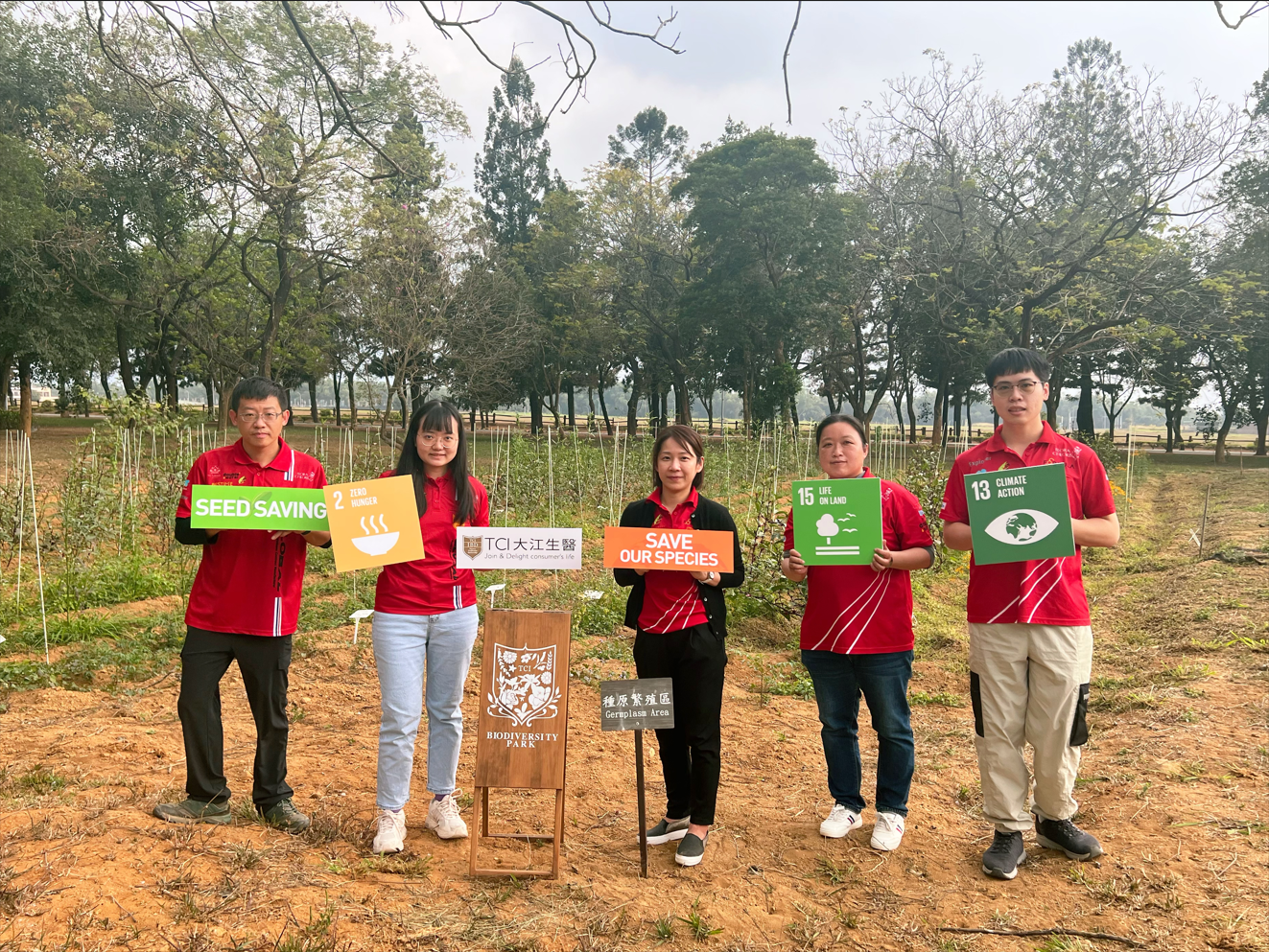APSAA 亞太永續行動獎(Asia-Pacific Sustainability Action Awards )-Sustainability Action Award SDG15:Bronze
TCI CO., LTD. 大江生醫股份有限公司

Coexisting with the Ecosystem: Restoring land ecology, reducing carbon emissions and minimizing environmental impact.
TCI cooperated with the National Pingtung University of Science and Technology to create Taiwan's first industry-academia collaborative "Biodiversity Park" (the "Park").
The Park has three major missions:
1.Enhance biodiversity: The Park aims to increase the number of species by 30% every year by 2025, with 2022 as the base year. The number of species is expected to grow to 448 in 2025.
According to the first ecological survey results by the end of 2022, the Park recorded a total of 80 plant species and 75 animal species, including the Sophrops Taiwana, an endemic insect to Taiwan. The number of plant and animal species increased by 13.7% and 11%, respectively, within four months after the establishment of the Park.
2.Develop technology-based agriculture: The Park introduced international CDM and VCS agricultural carbon credit methodologies including reducing the use of nitrogen fertilizers to reduce N20 emissions from crops and adding biochar to the farmland/grasslands. Now the Park uses Quinoa, buckwheat, and bananas as test crops and works with academic institutions to experiment with more efficient fixed-carbon farming methods.
3.Participate in global conservation initiatives: Through extensive seed restoration, TCI improves agricultural applications to identify species that are healthier for humans and more adaptable to climate change and develop them into highly effective health ingredients. From 2021, the company started to participate in the seed conservation program and adopt 30 seeds per year. Currently, wild soybeans, Hibiscus sabdariffa, and ivy gourd are planted and ready for harvesting in February 2023. After that, the seeds will be returned to the seed bank of The World Vegetable Center.
Using the 2.5-hectare campus as a demonstration area, TCI approximately invests USD $264.9 thousand for the first five years. We expect to expand its application to all contract farmers by 2025, creating more than 100 “Biodiversity Park" covering more than 1,000 hectares of land, and creating a new opportunity to realize triple prosperity.
Soil preparation and irrigation system has been completed in the Park. In addition, we finished the construction of seven primary areas, including the ecological pond, seed breeding area, negative carbon agriculture area, IBD (Integrated Bioscience Design) raw material farm, flatland forest area, ecological buffer zone, and promenade. Also, we carry out low-carbon farming experiments, habitat creation, and economical crop planting.
The Park has three major missions:
1.Enhance biodiversity: The Park aims to increase the number of species by 30% every year by 2025, with 2022 as the base year. The number of species is expected to grow to 448 in 2025.
According to the first ecological survey results by the end of 2022, the Park recorded a total of 80 plant species and 75 animal species, including the Sophrops Taiwana, an endemic insect to Taiwan. The number of plant and animal species increased by 13.7% and 11%, respectively, within four months after the establishment of the Park.
2.Develop technology-based agriculture: The Park introduced international CDM and VCS agricultural carbon credit methodologies including reducing the use of nitrogen fertilizers to reduce N20 emissions from crops and adding biochar to the farmland/grasslands. Now the Park uses Quinoa, buckwheat, and bananas as test crops and works with academic institutions to experiment with more efficient fixed-carbon farming methods.
3.Participate in global conservation initiatives: Through extensive seed restoration, TCI improves agricultural applications to identify species that are healthier for humans and more adaptable to climate change and develop them into highly effective health ingredients. From 2021, the company started to participate in the seed conservation program and adopt 30 seeds per year. Currently, wild soybeans, Hibiscus sabdariffa, and ivy gourd are planted and ready for harvesting in February 2023. After that, the seeds will be returned to the seed bank of The World Vegetable Center.
Using the 2.5-hectare campus as a demonstration area, TCI approximately invests USD $264.9 thousand for the first five years. We expect to expand its application to all contract farmers by 2025, creating more than 100 “Biodiversity Park" covering more than 1,000 hectares of land, and creating a new opportunity to realize triple prosperity.
Soil preparation and irrigation system has been completed in the Park. In addition, we finished the construction of seven primary areas, including the ecological pond, seed breeding area, negative carbon agriculture area, IBD (Integrated Bioscience Design) raw material farm, flatland forest area, ecological buffer zone, and promenade. Also, we carry out low-carbon farming experiments, habitat creation, and economical crop planting.

